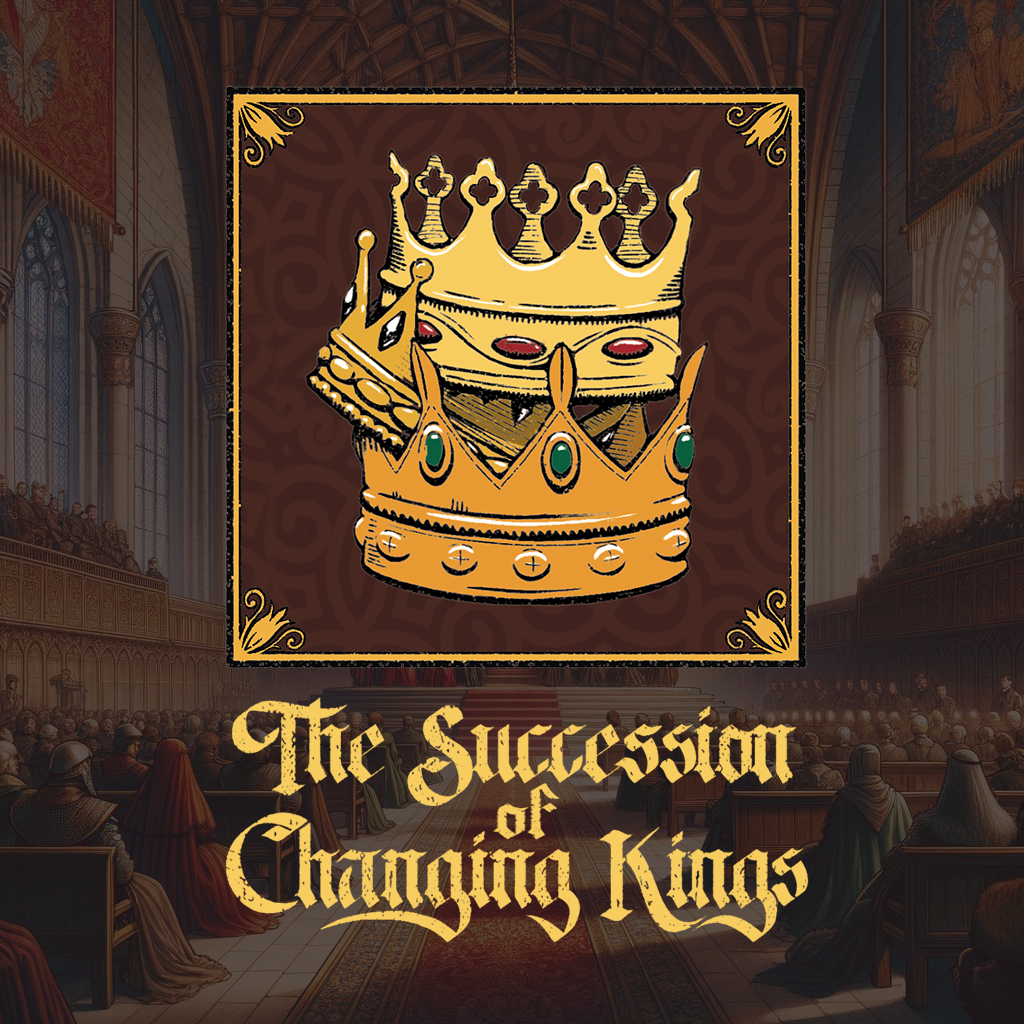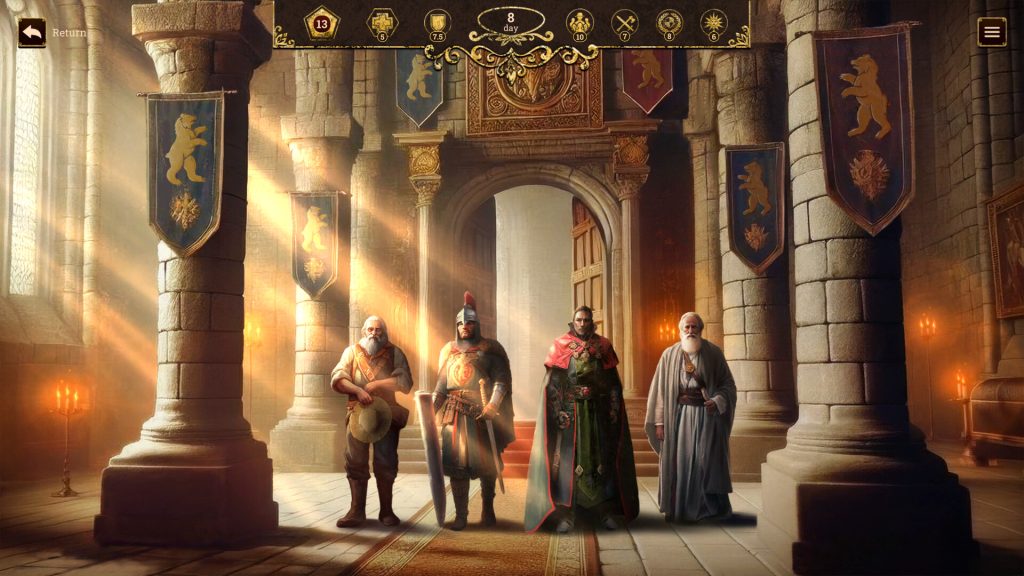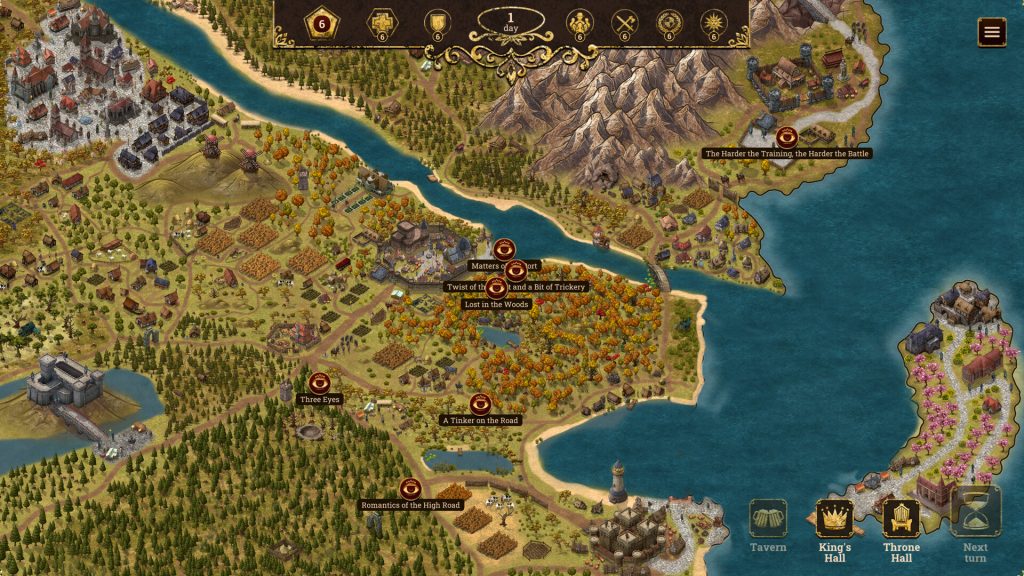A Kingdom on the Brink: Setting the Stage
The Succession of Changing Kings places you in the fraught shoes of a monarch presiding over a crumbling realm. Once prosperous lands have withered, trade has vanished, and your kingdom’s brightest minds are fleeing for greener pastures. The game’s opening moments immediately set a somber, almost desperate tone, immersing you in a world where every decision could spell salvation or doom. The world building here is genuinely impressive; the writing paints a vivid picture of decline, and the cast of characters you encounter each with their own quirks and motivations adds a layer of intrigue and dark humor that keeps the narrative engaging.
What struck me early on was how the game’s humor and personality shine through even in bleak circumstances. The dialogue is sharp, and the events are peppered with witty asides and clever references. This blend of grim stakes and levity creates a unique atmosphere, making the kingdom feel both lived in and unpredictable. It’s a rare balance that keeps you invested in the fate of your monarch, even as you brace yourself for the next disaster.

Core Gameplay: Balancing Power and Survival
At its heart, The Succession of Changing Kings is about resource and relationship management. Each turn, you must make tough choices: construct buildings, hire subjects, and resolve events that impact the four major factions nobility, army, church, and commoners. The mechanics are straightforward but satisfying, revolving around a handful of key resources: currency, healthcare, and defense. Every action you take ripples through these systems, forcing you to weigh short term gains against long term stability.
The game unfolds over four acts, each with 25 turns, for a total of 100 turns per playthrough. Each act presents its own self contained narrative, gradually building toward your coronation. This structure gives the game a sense of momentum, as you’re always working toward the next milestone. The sheer number of events over 200 per act, with many only appearing on replays ensures that no two games are exactly alike. The replay value here is significant, and the branching paths encourage experimentation and risk taking.
The Factions: Juggling Reputations and Consequences
Managing your relationships with the four factions is the game’s central challenge. Each group commoners, nobles, military, and priests has its own agenda and demands. Neglect any one of them, and you risk everything from unrest to outright assassination. What adds a layer of tension is that your reputation with these groups isn’t immediately visible; you must hire an informant, spending valuable initiative points for both recruitment and ongoing upkeep. This system can feel frustrating, as it turns the early game into a memory test rather than a strategic exercise.
In my opinion, making reputation levels visible from the start would streamline the experience and allow for more informed decision making. As it stands, the informant mechanic feels like an unnecessary hurdle akin to paying upkeep on a cooker in a restaurant sim just to see what’s burning. Given that low reputation can lead to instant death, transparency here would make the game more accessible without sacrificing challenge.

Events, Death, and Replayability
The event system is both the game’s greatest strength and its most significant weakness. Each turn presents multiple events, each with several possible resolutions. The writing is often witty and the scenarios creative, but the sheer volume of text can be overwhelming. Many events are padded with filler, and I found myself wishing that the text had been trimmed by at least half. Concise, impactful writing would keep the pace brisk and the stakes clear.
Death is omnipresent in The Succession of Changing Kings. There are currently over 80 ways for the king to meet his end, and the game delights in throwing unexpected insta kill scenarios at you. While this keeps you on your toes, it can also feel arbitrary. I would have preferred a health system that allows for injuries and gradual decline, rather than sudden, unexplained deaths. For example, being attacked by wolves should result in lasting damage or a chance to fight back especially if you’ve invested in relevant skills or advisors. More logical outcomes and partial indicators of risk would make the game feel fairer and more strategic.
Technical Details and Game Structure
The game is divided into four acts, each with a distinct narrative arc and a set of 25 turns. This episodic structure helps break up the experience, giving you clear goals and a sense of progression. With over 200 events per act and many scenarios only appearing in subsequent playthroughs, the content is impressively dense. The current release only covers the first act, but future updates promise even more variety and depth.
Achievements are cleverly tied to the many ways your reign can end of the 48 available achievements, most are awarded for dying in creative or unexpected ways. This morbid sense of humor is a hallmark of the game, and it encourages players to experiment with different choices just to see what happens. The mechanics themselves are simple: spend initiative to take actions, manage your resources, and try to keep all four factions happy. The challenge comes from the unpredictable consequences of your decisions and the ever present threat of disaster.

Personal Experience and Final Thoughts
My time with The Succession of Changing Kings was a rollercoaster of triumphs and failures. I was drawn in by the world building and the promise of meaningful choices, and I appreciated the way each decision felt weighty and consequential. The humor and personality of the writing kept me engaged, even as I grew frustrated with the opaque reputation system and the abundance of insta kill events. There’s a real sense of satisfaction in surviving from one act to the next, and the replay value is high thanks to the sheer number of events and possible outcomes.
That said, the game isn’t for everyone. The text heavy events and frequent, sometimes arbitrary deaths can be off putting, and the informant mechanic feels like an unnecessary barrier to strategic play. Still, if you enjoy narrative driven management games with a dark sense of humor and high stakes, there’s a lot to love here. The two hour Steam refund window gives you plenty of time to see if the game hooks you and if it does, you’ll find yourself coming back for “just one more run” again and again.
Conclusion
The Succession of Changing Kings is a unique blend of resource management, narrative choice, and dark comedy. Its world is rich and immersive, its characters memorable, and its challenges both brutal and rewarding. While there are areas that could benefit from streamlining particularly in the event writing and reputation systems the core experience is engaging and full of surprises. If you don’t mind a little (or a lot) of royal mortality, this is one kingdom worth ruling if only for a little while.